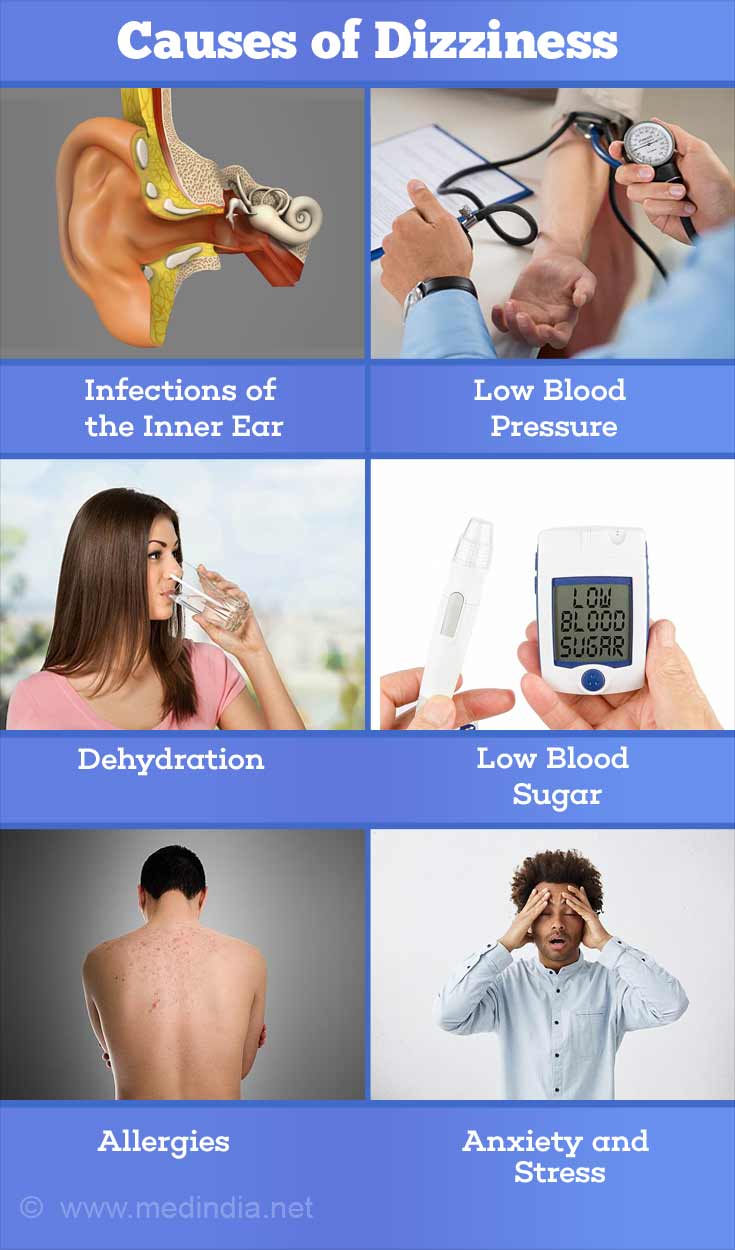- Vertigo & Dizziness: Difference? - (http://www.whirledfoundation.org/dizziness-imbalance-vertigo/vertigo/vertigo-dizziness-difference/)
- Dizziness and vertigo - (https://www.betterhealth.vic.gov.au/health/conditionsandtreatments/dizziness-and-vertigo)
Dizziness and Vertigo - What is the difference?
Dizziness is a feeling of being lightheaded, faint, weak or unsteady. Dizziness makes you feel momentarily unbalanced and can range from mild dizzy spells to a serious condition. These dizzy spells often stop or improve when you lie down. Vertigo is a feeling that you or your surroundings are spinning or moving when there is no actual body movement.
The main difference is that vertigo can cause nausea or vomiting and loss of balance. There may be difficulty in walking which can cause you to lose your balance and fall, resulting in injuries. Vertigo is usually caused by a problem in the inner ear, the vestibular system that controls our balance. The word vertigo comes from the Latin “verter” which means to turn. The most common form of vertigo is the Benign Paroxysmal Positional Vertigo (BPPV).
Why am I Dizzy?
Infections of the Inner Ear- In these cases dizziness usually comes on suddenly and may be accompanied with ringing in the ears, pain in ears and hardness of hearing. Infections can be either bacterial or viral. The bacterial infections are treated with antibiotics after culture tests are done to identify the causative bacteria.
Meniere's Disease - This is a rare disorder that develops after fluid accumulates in the inner ear causing the pressure levels to change within the ear. People with this condition suffer from severe vertigo, feeling of pressure, ringing in ears, nausea and hearing loss. Mostly a single ear is affected.
Disturbances in Circulation - When the brain does not receive a steady supply of oxygenated blood due to blood clots, very deep or rapid breathing (hyperventilation), irregular heartbeats (cardiac arrhythmias), or sudden changes in posture, you may become dizzy or even faint.
Dehydration - Vomiting, diarrhea, fevers can result in severe dehydration which may cause your blood pressure to drop. Your brain may not get enough oxygen and you will feel dizzy. Drinking plenty of water, lemonade, diluted fruit juices and avoiding fizzy drinks, coffee will help you counteract dehydration.
Low Blood Sugar - You can get dizzy if the blood sugar drops too low (normal range is 80-110 milligrams per deciliter). You will also experience pangs of hunger, tremors and confusion. A quick fix is to eat or drink something with sugar such as a candy, ice cream, juices.
Allergies - Recurring allergies of the ear, nose, throat and sinuses may cause fluid buildup in the inner ear. This may lead to dizziness and other balance problems.
Anxiety and Stress - These may cause dizziness or may be a contributing factor in dizziness from other causes.
Migraine - There may be dizziness before, during or after the headache.
Low Blood Pressure - A sudden fall in blood pressure when you suddenly sit, stand up or change position is known as postural hypotension. This goes away after lying down and is more common in elderly people.
Tumor in the Brain or Inner Ear - An acoustic neuroma is a tumor that grows on the cranial nerve that connects the ear to the brain. It can affect hearing and cause dizziness.
Bleeding - Loss of blood can occur in small amounts inside your body such as the digestive tract for a long time or heavy menstrual bleeding may cause lightheadedness and fatigue.
Medications - Sedatives, illegal drugs, antibiotics such as streptomycin and gentamycin, anti depressants, drugs to control high blood pressure, epilepsy may cause dizziness in some people.

Is it Vertigo?
Vertigo is diagnosed with the help of patient’s history and physical examination. The doctor questions the patient about the duration, severity of the dizziness problem and may look for physical signs such as fast uncontrolled eye movements (nystagmus). The following tests may be advised to confirm the diagnosis of vertigo.
Dix-Hall Pike Test - The head is moved in different directions and the eye movements are assessed and seen whether they correlate with the vertigo symptoms.
CT Scan or MRI - These tests are done to rule out brain tumor.
Computerized Dynamic Posturography - The patient is asked to stand on a movable platform and their responses to movement are recorded.
Electro Nystagmograph- Eliciting abnormal oscillating movement of the eyes can help determine if the symptoms are those of vertigo.
Audiometry - These tests are done to check hearing abilities. Testing of fluid samples from inner ear and spine - This is done in patients where infection is suspected to be a causative factor.
How do you get rid of Vertigo and Dizziness?
- Head Maneuvers (Canalith Positioning Procedures or CRP). Certain types of head exercises can help break and move calcium deposits out of certain areas in the inner ear. CRP is very effective in people who suffer from benign paroxysmal positional vertigo (BPPV) with an approximate cure rate of 75-80 percent. It is also helpful in preventing recurrence of vertigo.
- Physical Therapy. This treatment works by building better hand-eye coordination, improving balance and strengthening joints and muscles.
- Stress busters- Yoga, meditation, outdoor activities, using essential oils are helpful in lowering anxiety levels.
- Get enough sleep. Make it a priority to get seven to eight hours of sleep every night, so your body and mind feel energized to tackle work at office and at home.
- Drink sufficient water. Even mild dehydration can cause dizziness and changes in blood pressure that can make you feel dizzy and nauseous.
- Include anti inflammatory foods in the diet. Leafy vegetables, fresh fruit such as bananas and avocado, healthy fats such as coconut oil and extra virgin olive oil, lean protein, as found in grass-fed animals improve the HDL or good fat levels and lower inflammatory processes within the body. Eating a well balanced diet also helps to avoid Vitamin D and Vitamin B12 deficiency which may be a factor in causing dizziness.







